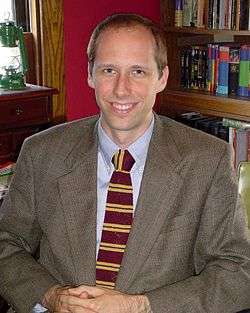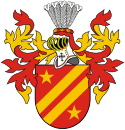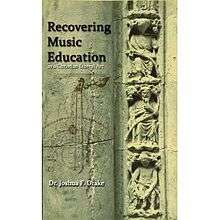Josh Drake
| Dr. Joshua F. Drake | |
|---|---|
 | |
| Born | Tennessee |
| Occupation | Musicologist, hymnist, academic |
Dr. Joshua F. Drake is a musicologist and hymnist at Grove City College in Grove City, Pennsylvania.[1] His research, writing and presentations primarily analyze the structure of 15th century Latin Christian motets, which are a category of choral musical compositions. Drake is notable for his research and papers that challenge commonly held views regarding the relationship between words and music in motets of the late 15th century, as well as his discoveries related to the origins of the Buonaparte family.[2] He also serves on the editorial advisory board for "The Quad" Magazine.[3]
While the earliest motets originated during the 13th century, the relationship between words and music in the 15th century is particularly significant in the study of music because it coincides with the Protestant Reformation, which completely reordered Western society and had a profound influence on the evolution of music.
Education
- B.M. Union University (Sacred Music)
- M. Mus. University of Glasgow (Musicology) thesis - Text-Music Relationships c. 1500: Case Studies from Petrucci’s Motets
- Ph.D. University of Glasgow (Sacred Music) dissertation - The Contemporary Perception of Text-Music Relations in Motets c. 1500[4]
Discoveries related to the Buonaparte family

Drake's research into Ms. Magl.XIX 164–7 located at the Biblioteca Nazionale Centrale Firenze uncovered previously unidentified emblems in the bassus partbook. Drake's further investigations led him to suggest that the emblems should be associated with the Buonaparte family and, perhaps, with Pope Clement VII's friend and advisor Jacopo Buonaparte who witnessed and wrote an important account of the sack of Rome (1527).
Drake makes this association because of the emblems' similarity to the Buonaparte coat of arms.
The partbooks he analyzed consist of 49 Italian, 24 French secular and 13 Latin sacred musical compositions from early composers such as Josquin, Heinrich Isaac, Sebastiano Festa and Bernardo Pisano and have been essential in reconstructing the life of Pisano.
Drake also suggests that the association with the Buonaparte family helps to explain the geographical disputes that exist due to the partbooks having a Roman binding yet a Florentine script and Florentine paper. He makes this further assertion in part because the Buonaparte family was Florentine but Jacopo Buonaparte spent a great deal of time in Rome, in addition to the coat of arms in the partbooks being so similar to those of the Buonapart family.[2]
Selected works
Books and media

- Joshua Drake, Recovering Music Education as a Christian Liberal Art, (BorderStone Press, LLC) (2010).
- Joshua Drake, Gene Veith and Timothy Chambers, Generation Joshua DVD: "Picturing America: A Different Lens!" (2009)[5]
- Joshua Drake, Botticelli, The Encyclopedia of Christian Civilization, ed. G. Kurian, (Blackwell, Dec. 2008).
- Joshua Drake, Donatello, The Encyclopedia of Christian Civilization, ed. G. Kurian, (Blackwell, Dec. 2008).
- Joshua Drake, The Part-books of a Florentine Ex-Patriate: new light on Florence, Biblioteca Nazionale Centrale Ms. Magl. XIX 164-7, Early Music (OUP), Vol. 33, no. 4 (Oct. 2005), pp. 639–646.[6]
- Joshua Drake, Aesthetics, Context, and the Music of Obrecht, panel discussion (with panelists Jenny Bloxam (US), Jacobijn Kiel (NL), Sean Gallagher (US)) at the Annual Medieval and Renaissance Music Conference, Glasgow, Scotland, July 2004. Professor Drake was also on the programme committee for this conference and chaired a session.[7][8] [9]
- Joshua Drake, Randomness and Patterns: repeated texts in Petrucci’s Motet Prints, paper given at the Annual Medieval and Renaissance Music Conference, Jena, Germany, July 2003.[10]
- Joshua Drake, The Part-books of a Florentine Ex-Patriate: new light on Florence, Biblioteca Nazionale Centrale Ms. Magl. XIX 164-7, paper given at the Royal Musical Association, 36th Annual Music Research Students’ Conference, January 2003.
- Joshua Drake, Worship Music In toto, Union Academic Forum, Union University (December 14, 2000).
Selected conferences
- Joshua Drake, Chair of Memory & Rhetoric, Thursday 15 July, Annual Medieval and Renaissance Music Conference, Glasgow, Scotland, July 2004.[11][12][13]
Selected hymns and music
Hymns
- As in the Days of Haggai When
- Behold, What Light Rolls Back the Sky?
- Eternal God, Mover Unmoved
- Holy Word of God, The
- O Christian Home
- Spirit Binds Us to Our Lord, The
Music
- Flandrensis
- Forest Glen
- Français
- Honoro Patris
- Lex Noster
- Schultz
Public availability of works here[14][15]
References
- ↑ Grove City College Faculty
- 1 2 The partbooks of a Florentine ex-patriate: new light on Florence, Biblioteca Nazionale Centrale Ms. Magl. XIX 164-7 - Drake 33 (4): 639 - Early Music
- ↑ http://quadmagazine.org/winter09.pdf
- ↑ University of Glasgow, Student Research
- ↑ http://www.generationjoshua.org/dnn/LinkClick.aspx?fileticket=F4HLm7Sg%2FMQ%3D&tabid=556
- ↑ Oxford Journals, Early Music, EMM Nov 2005 # 33.4, 639 The Part-books of a Florentine Expatriate
- ↑ Royal Holloway, University of London, The Royal Musical Association Med-Ren Music Conference Glasgow Thursday 15 – Sunday 18 July 2004, Memory and Rhetoric, Joshua Drake Chair
- ↑ http://cfp.english.upenn.edu/archive/2003-11/0138.html
- ↑ http://www2.rhbnc.ac.uk/Music/Conferences/PROG-RMRC.pdf
- ↑ Jena Conference abstract - Randomness and Patterns: repeated texts in Petrucci’s Motet Prints
- ↑ University of London, Royal Holloway, The Royal Musical Association Med-Ren Music Conference Glasgow Thursday 15 -- Sunday 18 July 2004, Memory and Rhetoric, Joshua Drake Chair
- ↑ http://cfp.english.upenn.edu/archive/2003-11/0138.html
- ↑ http://www2.rhbnc.ac.uk/Music/Conferences/PROG-RMRC.pdf
- ↑ Cyberhymnal Publicly available works by J. Drake
- ↑ Church Music Management System Database
External links
- Church Music Management System Database
- Ingentaconnect
- Project Muse, Scholarly Journals
- Worship Music In Toto, Union University
- Department of Music, University of Glasgow
- Student Research, University of Glasgow